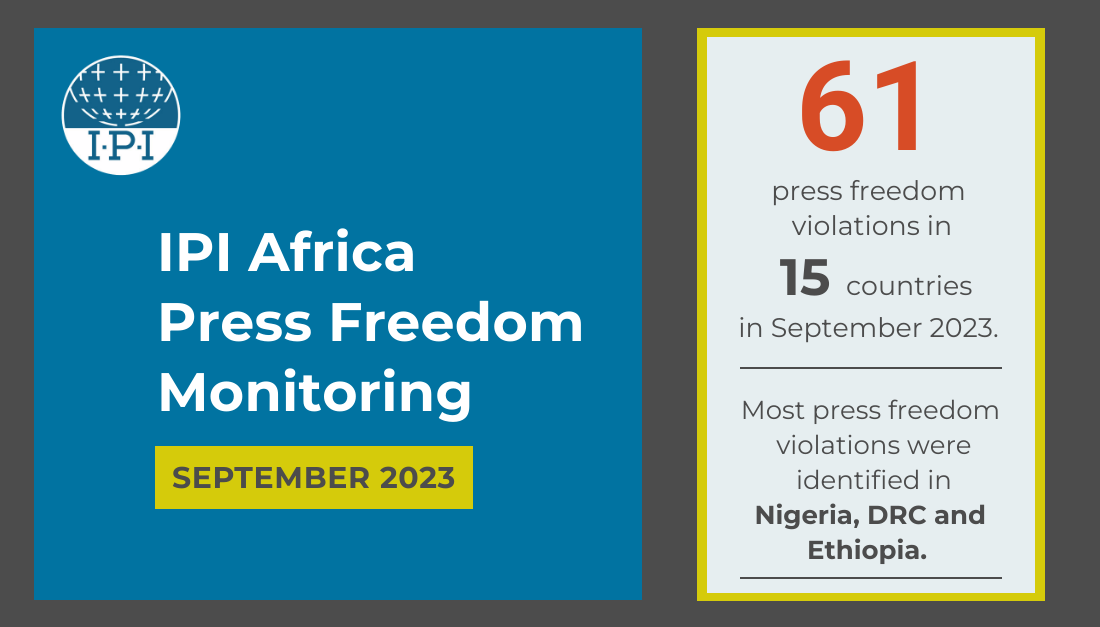In September, IPI documented 61 threats to press freedom in 15 countries across the sub-Saharan African region. The countries that recorded the most incidents of press freedom violations are Nigeria (13), the Democratic Republic of Congo (DRC, 10), and Ethiopia (6).
DOWNLOAD THE FACTSHEET HERE (pdf file)
As in August, physical, verbal, and online attacks were the most frequent type of threats to journalists in September. Other incidents recorded fell under the categories of censorship, surveillance of journalists, and restriction of access to information. The violations and threats recorded involved 55 male and 7 female journalists. State actors remain the main perpetrators, responsible for more than 85% of the attacks on journalists and media recorded in September.
For instance, on September 11, the Nigeria Police Service in Kwara state arrested and unlawfully detained two journalists for ten days following a defamation complaint by the former principal private secretary to the state governor. On September 18, officers of the Federal Road Safety Corps (FRSC) in Abuja physically attacked journalist Mustapha Usman of the International Centre for Investigative Reporting (ICIR) and confiscated his identification card.
In the DRC, on September 8, 2023, journalist Stanis Bujakera Tshiamala was arrested in Lubumbashi in the south-east of the country. He was accused of “spreading false rumors’ ‘ and disseminating “false information”. His arrest and detention was in apparent retaliation for a story published by the monthly magazine Jeune Afrique on August 31 in relation to the killing in July of former Transport Minister and opposition lawmaker Cherubin Okende.
In Ethiopia, on September 7, 2023, police in Mekelle, the capital city of the Tigray region in Ethiopia, assaulted and detained three journalists – Teshager Tsigab of Yabele Media and Mehari Kahsay and Mehari Selomon of Ayaw Media – amid a brutal crackdown on public protests against the interim local government. Kahsay and Solomon were released on bail on September 9 and were accused of participating in illegal protests. Tshigab, who was detained without being charged, was released on September 11. The Tigray region has been torn by an internal conflict that started in November 2020 between the central government and the Tigray People’s Liberation Front (TPLF). A peace deal signed in November 2022 brought a ceasefire. Several journalists have been arrested and detained since then, and the press freedom situation remains dire.
On September 16, Angolan journalist Daniel Frederico was arrested and detained while covering a demonstration against planned traffic restrictions against motorcycle taxis in Luanda, the capital city of Angola. Frederico was arrested and detained alongside six activists, and released on bail on September 20. His mobile phone was also confiscated and was not returned to him when he was released.
In Ghana, according to the Media Foundation for West Africa (MFWA), police assaulted at least five journalists as they were covering a public demonstration against economic hardship staged by a local political pressure group.
In South Africa, according to the South African National Editors Forum (SANEF), on September 19, 2023, journalist Lerato Mutsila was intimidated and assaulted by security guards for Standard Bank, who also deleted video and photos from her phone. The bank later apologized and indicated respect for press freedom.
* Note: IPI collects data on press freedom violations and threats across Africa. These incidents can involve individual journalists and/or media outlets. Each incident is assigned different categories of violations (which can include physical assaults to legal threats). There can be multiple types of violations or threats involving the same case and the same journalist or media outlet. When these incidents involve individual journalists, we record the gender of individual journalists, if this information is available. For this reason, the total number of violations does not always equal the total number of incidents recorded by gender or by media outlet.
IPI monitors and collects data on press freedom violations in Africa using a standardized methodology that categorizes violations across the following main categories: physical, verbal or online attacks; arrests and charges against journalists; surveillance of journalists; cases of censorship; laws and regulations that restrict the press freedom; and restriction on access to information. Data are further disaggregated by gender. Our monitoring and data collection activities are part of IPI’s wider Africa programme, which aims to defend press freedom and the safety of journalists in sub-Saharan Africa.
